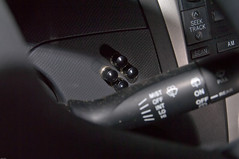Since every gallon counts at today’s gas prices, even the simplest improvements to gas mileage can lead to more money in your pockets. Although many products make gaudy claims to improve gas mileage drastically, most (if not all) of these claims are unproven. As usual, the best remedies are usually the simple and somewhat obvious ones. For instance, use your car’s already existing features to ease up on your gas usage when you are driving around from place to place.
| Yaris Cruise Control (Photo credit: nebarnix) |
However, cruise control is also a great way to conserve gas! When you are on the highway, the cruise control can help your car to stay at a consistent speed. This means that you will not be accidentally increasing your speed and making the car periodically work harder.
If you have an “overdrive” option for your car, you should use the overdrive gears whenever possible. Overdrive allows your engine to work much less than it would otherwise. Of course, the less your engine works, the less gasoline you use. In other words, overdrive alone will increase your vehicle’s fuel efficiency.
While you are at it, keep your eye on your RPM gauge, especially if you drive a manual transmission automobile - but you can learn to use this in an automatic car as well. After all, any time your car is running in the high end of the RPM range, you are using more engine power than you need to, and thus more gas. Make sure that you are not staying in the low gears for too long before shifting, and spend as much time in the comfortable RPM range of higher gears as you can, since you will save yourself some gas in the process. The RPM gauge is another example of an under-utilized feature that, if used correctly, can help you to conserve gas. (In an automatic transmission car, with a little practice, you can learn to use the gas pedal to shift gears smoothly and work your way up into the higher gears sooner.)
| Symbol of Air conditioning in a BMW car. (Photo credit: Wikipedia) |
As you can see, there are many fairly basic features your car may already have that, with regular use, can help you go longer between trips to the gas station. Even though some of these features may only have a small effect on your car’s gas usage, if you follow all of the tips, it will add up. With gas prices as high as they are now, even if you can save a gallon or two here and there, that can be a pretty substantial savings for you!



No comments:
Post a Comment